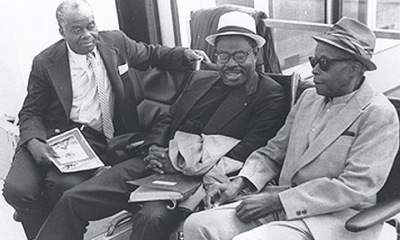Hall of Giants: Dr. John Henrik Clarke, Yosef ben-Jochannan and Chancellor Williams
[REMEMBERING OUR MASTER TEACHER]
On the last day of winter, March 19, 2015 at three o’clock in the morning, Dr. Yosef A. A. ben-Jochannan made his transition, leaving to mourn an international family which numbers in the hundreds of thousands.
The Committee To Eliminate Media Offensive to African Peoples (CEMOTAP) had recently celebrated Dr. Ben’s 96 years, and we had been holding our master teacher in our prayers for many months. We cannot express enough love and thanks for this life we treasure, for sustaining knowledge imparted so generously; for this knowledge which continues to empower us.
Dr. Ben’s encyclopedic memory astounded us as he delivered insightful lectures without constant reference to notes. His brilliant mind and cutting humor renewed listeners who always came early to secure a seat at those packed Saturday meetings held at Convent Avenue Baptist Church, sponsored by First World.
Dr. Ben’s seminal work, “Black Man of the Nile” and His Family stated with intricate documentation what the Brooklyn Museum would later observe: the origin of ancient Egyptian civilization is clearly African.
This book, first published in 1972, and those empowering lectures helped us to know ourselves in ways that would influence our own teachings, providing the historical grounding missing from our formal education. Photographs, maps, newspaper articles, knowledge of hieroglyphics, and twenty-seven pages of bibliography and supporting documentation provide the knowledge missing from American public education.
Dr. Ben, as this master scholar as affectionately referred to, notes the Anti-Negro, Anti-African, Anti-African American biases which inhibited Egyptologists and which are reflected in the contemporary disorders addressed by the movement, “Black Lives Matter.”
We watched Dr. Ben on Gil Noble’s “Like it Is” hold a dialogue with a religious leader, challenging “facts” which the religious leader finally admitted was “nationalistic poetry.” In 1980 I was among the fortunate travelers, forty-seven African American professionals, artists, lawyers, educators, to experience Egypt under the guidance of Dr. Ben.
He knew all the guides, as though they were family. On certain days, he made us rise at 3 a.m. so that we could reach significant monuments before 10 a.m., when the Sun would bring the summer temperatures close to 100 degrees. Through lectures each evening, we would review history and the experience of the day and learn of monuments to be visited the following day.
I had never worked so hard before on a vacation. It was exhilarating.
When we reached the pyramid of Khufu, the largest building in the world, I had no intention of climbing all those stairs to the king’s chamber until I heard Dr. Ben’s voice saying, “Try. And if you get tired you can turn around and come back.”
I would learn one of the fastest lessons in physics that day when I reached the king’s chamber. Our ancestors were able to build a space that was only 60 degrees inside when it was close to 100 degrees outside. That’s good science.
That was also an effective teaching tool, encouraging us to go forward, to make the effort, rather than to conclude beforehand that something which is possible is impossible.
Dr. Ben’s formal teaching career includes: Instructor in History of Religion and Black Studies at Marymount College; Adjunct Professor in History at Borough of Manhattan Community College; Adjunct Professor of History at Rutgers University; and, Adjunct Associate Professor of History at Pace College.
Not too many years ago, we watched Dr. Ben weep at the ceremony for his dear friend and fellow scholar, Dr. John Henrik Clarke. There will be some weeping in the days ahead as we prepare to say a formal good-bye; but there continues to be his voice, his writings, his wisdom.
Even as we send condolences to his family, there will be great celebrations for the inspiring life of Dr. Yosef A.A. ben-Jochannan; master teacher who lives forever.







